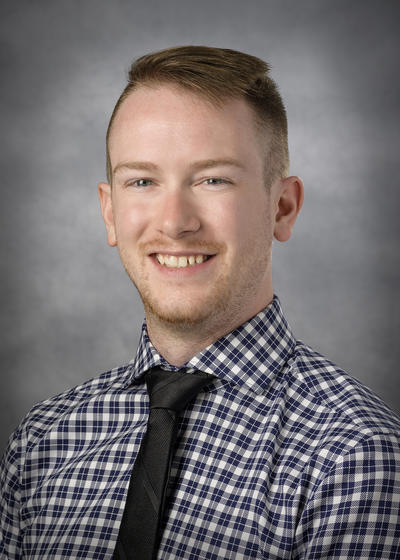
For Kyle Henneke, the first year of medical school has been an eye-opening experience.
“Because I’m bringing a lot of clinical experience with me, I’m finding that I’m constantly experiencing epiphanies and making connections,” said Henneke, who was an emergency room nurse before enrolling at the Wright State University Boonshoft School of Medicine. “I’m deepening my knowledge, which is why I wanted to come to medical school in the first place.”
He always had a passion for health care. But it took a few years of real-world experience to determine that he wanted to be a physician.
“Emergency medicine really calls to me,” said Henneke, a military kid, who moved every two years until he settled in Fairborn, Ohio. “I really can’t wait to get out there and make a difference.”
In the meantime, Henneke has wasted no time getting involved at the Boonshoft School of Medicine. He volunteers with the Latino Medical Student Association, which unites and empowers medical students through service, mentorship, and education to advocate for the health of the Latino community; Reach Out of Montgomery County, a medical clinic that provides health care to the uninsured and the underinsured; Student to Student, a community education program run by medical students; Students Teaching Educational Plans for Success Initiative (STEPS), a student-driven, interdisciplinary health promotion organization; and the Global Health Initiative, a student-run organization that facilitates global medical experiences. He also serves as a class representative on the Class Council.
In addition, he was accepted into the medical school’s Physician Leadership Development Program (PLDP), a five-year program that facilitates the completion of a Master of Public Health (M.P.H.) or Master of Business Administration (M.B.A.) degree while completing medical school. Henneke plans to pursue his M.P.H. degree next year.
“I’m very interested in health policy — the legislation process and its impact on the American public,” he said. “An M.P.H. degree ties in well with my interests in public and global health.”
While practicing as an ER nurse, Henneke found that he loved the autonomy he experienced but felt limited in what he could do. During the past couple years, he found himself reaching to excel at any skill he could. He obtained his emergency nurse certification and trauma RN certification.
Henneke completed training on IV ultrasound skills and became one of a few people trained to cannulate external jugular veins at the hospital where he worked. He started attending classes on more advanced concepts like 12-lead electrocardiogram (ECG) interpretation, arterial blood gas (ABD) interpretation, and advanced pharmacology.
“After taking these classes, I wanted to learn more and do more,” he said. “I was inspired and encouraged by my physician colleagues to apply to medical school.”
Working in the ER gave Henneke insight into population health. As a medical student, he wants to learn more about population health to help improve the health outcomes of individuals.
“Health care in this country is so much bigger than one patient or the group of patients I saw in a day,” said Henneke, who still works short shifts as a nurse to keep up his skills and interact with patients. “It’s like a pulse-check on our society. I like to know how we are doing in terms of health outcomes for many people. I want to help find solutions.”
His interest in population health led him to attend the 2018 National Summit on the Social Determinants of Health in October in New Orleans, Louisiana. The summit brought together more than 600 attendees to discuss how social determinant interventions can help achieve health equity. The summit was hosted by The Root Cause Coalition, a nonprofit organization comprised of more than 60 health systems, hospital associations, foundations, businesses, national and community nonprofits, health insurers, academic institutions, and policy centers. Root Cause works to achieve health equity through cross-sector collaboration in advocacy, education, and research.
Henneke was one of 30 students selected nationwide to receive a student scholarship to attend the summit. He was chosen because of his dedication to health equity and his passion for improving the field of health care.
Sabrina Neeley, Ph.D., M.P.H., director of Population Health and IPE Curriculum, director of the Physician Leadership Development Program (PLDP), and associate professor in the Department of Population and Public Health Sciences, recommended Henneke for the scholarship to the conference.
“Kyle has demonstrated a keen interest in population health and in learning how addressing social determinants of health lead to improved patient outcomes,” she said. “I recommended him for the scholarship to the conference because I knew he would engage completely with the presenters and other attendees and would have the opportunity to learn more about the evidence behind addressing social determinants of health.”
Henneke joined a cohort of future leaders of health care at the summit who also share his commitment to population health and addressing the social determinants of health.
“I learned about the obstacles that many people have tried to overcome just to get something as simple as social determinants of health screening tools in ER triage questionnaires,” Henneke said. “It’s important to understand the conditions in which patients are born, live, learn, work, and play to best help them when you treat them. These conditions affect their health.”
Back at the Boonshoft School of Medicine, Henneke is working with Priti Parikh, Ph.D., associate professor of surgery, who is conducting research on prehospital triage.
“This translates into better managing patient flow via emergency medical services to mitigate patient mortality and control costs to trauma systems,” he said. “This is related to managing population health in terms of trauma.”
He is thrilled to be studying medicine at the Boonshoft School of Medicine. “Medical school has deepened my understanding of certain things I learned in nursing school and as an emergency room nurse,” he said. “What I have been doing for three years suddenly makes sense in a completely different way.”
-Heather Maurer

